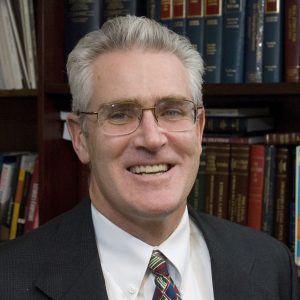Editor’s Note: In this BC Law Magazine “Vision Project” series, we are engaged in a lengthy discussion with Boston College Law School faculty about where the Covid-19 pandemic and its attendant medical, economic, racial, and political consequences may lead us. As New York Times op-ed columnist Timothy Egan so eloquently put it recently, “Every crisis opens a course to the unknown. In an eye-blink, the impossible becomes possible. History in a sprint can mean a dark, lasting turn for the worse, or a new day of enlightened public policy.” There are warnings and worries in these professors’ views, but there are also farsighted ideas and strategies for crafting a better future, a more just society, and a world in which each and every human being is equal under the law.
PROFESSOR R. MICHAEL CASSIDY
Professor Cassidy teaches and writes in the areas of criminal law, evidence, and professional responsibility. He is considered an expert on the subject of prosecutorial ethics, and provides training nationally to public sector attorneys on their responsibilities under the Rules of Professional Conduct. From 1993 to 1996, Cassidy served as Chief of the Criminal Bureau in the Massachusetts Attorney General’s Office.

What have the twin pandemics of coronavirus and racism revealed about the strengths and weaknesses of our criminal justice system? I was struck by what both pandemics have taught us about the consequences to society when law lacks moral authority. People in most states were willing to abide by stay-at-home orders in March and April when they felt that these laws were necessary to further the collective good. Compare that to the public marches that occurred upon the murder of George Floyd in May. People were willing to violate stay-at-home orders and risk their health and possibly the wellbeing of others to protest a morally deficient policing system.
What short- and long-term opportunities do you see arising from the pandemics for improving how we define and deliver justice? Like any large organization, court systems have learned a great deal during the Covid-19 pandemic about how they can operate remotely and still be somewhat productive. Defendants have constitutional protections that prevent certain portions of a criminal proceeding from being conducted “virtually.” But others can be conducted using technology, and they have: bail hearings, pre-trial conferences, certain motions, etc. I think this may continue even after the pandemic is over. For example, I am serving on a committee formed by the Massachusetts Supreme Judicial Court that is tasked with determining whether and how state grand jury investigations may be conducted remotely using technology. It may be that in the future twenty-three citizens never have to come into the same room to hear evidence to consider and issue an indictment.
Massachusetts is one of only six states that does not have a unified system for training and certifying police officers. I hope that this is something that changes very soon. As we have seen from the killings of innocent African Americans at the hands of the police this spring, this function is too important to leave to the individual discretion of 351 cities and towns in Massachusetts.
There is a lot of confusion and misinformation about “no-knock” search warrants following the tragic death of Breonna Taylor. I have defended no-knock warrants before our State Supreme Judicial Court. But I think they should be severely curtailed. They should not be used for routine drug or property offenses. They should not be applied between the hours of 10 p.m. and 7 a.m., when residents are likely to be sleeping and disoriented. Police officers entering the premises should not be allowed to wear plain clothes, where they can readily be confused with intruders. Moreover, judges and magistrates who are asked to approve no-knock warrants should be given clear guidelines and training setting forth those very limited circumstances where they are appropriate.
What is your vision for a post-pandemic world? What policies and plans would you recommend to guide us toward building and sustaining a stronger and more just society? Even though my field is criminal justice, this pandemic has caused me to worry a lot about educational equity in the United States. Higher education is in turmoil because of the risks and logistics of bringing students back to campus. But the real inequities are going to occur at the elementary and middle school levels.
We already have four months of lost learning in the United States. Indeed, many students have been “lost” in the system and are not even attending classes online, even if (and this is a big if) they have the technology, the bandwidth, and the family support to do so. As public school systems open up in the fall and systems look for ways to reduce building load—perhaps in a shortened “split day” system or by alternating school days—I hope superintendents will look backwards toward the spring of 2020 to assess what worked and what didn’t work in online delivery, and try to re-envision hybrid models of education that will truly be inclusive across socio-economic, racial, and ethnic populations.
Public education is key to reducing income inequality in America. Unfortunately, the Covid-19 pandemic has the possibility of pushing us absolutely in the wrong direction in this regard unless we take strong corrective measures. States and cities that are looking toward defunding police budgets should look first and foremost towards “refunding” education.
Read all faculty Vision Project interviews here.

